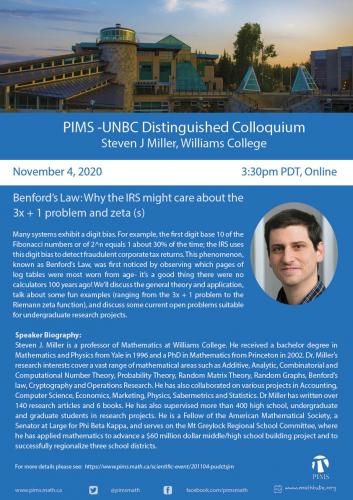PIMS-UNBC Distinguished Colloquium Talk: Steven J. Miller
Topic
Benford's Law: Why the IRS might care about the 3x + 1 problem and zeta (s) [Video]
Speakers
Details
Many systems exhibit a digit bias. For example, the first digit base 10 of the Fibonacci numbers or of 2^n equals 1 about 30% of the time; the IRS uses this digit bias to detect fraudulent corporate tax returns. This phenomenon, known as Benford's Law, was first noticed by observing which pages of log tables were most worn from age- it's a good thing there were no calculators 100 years ago! We'll discuss the general theory and application, talk about some fun examples (ranging from the 3x + 1 problem to the Riemann zeta function), and discuss some current open problems suitable for undergraduate research projects.
Speaker Biography:
Steven J. Miller is a professor of Mathematics at Williams College. He received a bachelor degree in Mathematics and Physics from Yale in 1996 and a PhD in Mathematics from Princeton in 2002. Dr. Miller's research interests cover a vast range of mathematical areas such as Additive, Analytic, Combinatorial and Computational Number Theory, Probability Theory, Random Matrix Theory, Random Graphs, Benford's law, Cryptography and Operations Research. He has also collaborated on various projects in Accounting, Computer Science, Economics, Marketing, Physics, Sabermetrics and Statistics. Dr Miller has written over 140 research articles and 6 books. He has also supervised more than 400 high school, undergraduate and graduate students in research projects. He is a Fellow of the American Mathematical Society, a Senator at Large for Phi Beta Kappa, and serves on the Mt Greylock Regional School Committee, where he has applied mathematics to advance a $60 million dollar middle/high school building project and to successfully regionalize three school districts.

